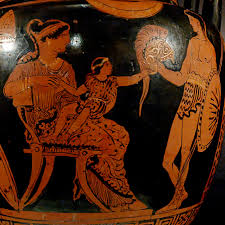记忆方法
hector:Troy的赫克托尔(Hector),Priam之子,因勇猛而著称。变成单词后的意思是——凌辱,威吓。
中文词源
hector 威吓,威逼
来自古希腊城邦特洛伊第一勇士Hector,后被街头土匪当祖师爷崇拜,成为土匪代称,引申词义威吓,威逼。其字面意思为坚持者,有韧劲的人,来自希腊语ekhein,持有,保持,持续。参照电影《特洛伊》。
英语词源
- hector (n.)
- late 14c., "a valiant warrior," 1650s as slang for "a blustering, turbulent, pervicacious, noisy fellow" [Johnson], Heck for short, both in reference to the provocative character of Hektor, Trojan hero, oldest son of Priam and Hecuba, in the "Iliad." It represents Greek hektor, literally "holder, stayer;" an agent noun from ekhein "to have, hold, possess" (see scheme). The word was used mid-1600s in reference to London street gangs. As a proper name it is rare in England but used in Scotland to render Gaelic Eachdonn.
- hector (v.)
- 1650s, from Hector (n.), in reference to his encouragement of his fellow Trojans to keep up the fight. Related: Hectored; hectoring.
权威例句
- 1. You wear hector's cloak.
- 偷鸡不着蚀把米.
- 2. She does now and then hector a little.
- 她有时会表现出作威作福的样子.
- 3. He had been disturbed by the news of the attack on Hector Coyne.
- 赫克托·科因受袭的消息让他焦虑不安。
- 4. I suppose you'll hector me until I phone him.
- 我想若是我不给他打电话,你就会一直威吓我。
- 5. Hector returned his scrutiny with deep interest.
- 艾尔多尔,对于他这种审视,也发生深深的兴趣.

